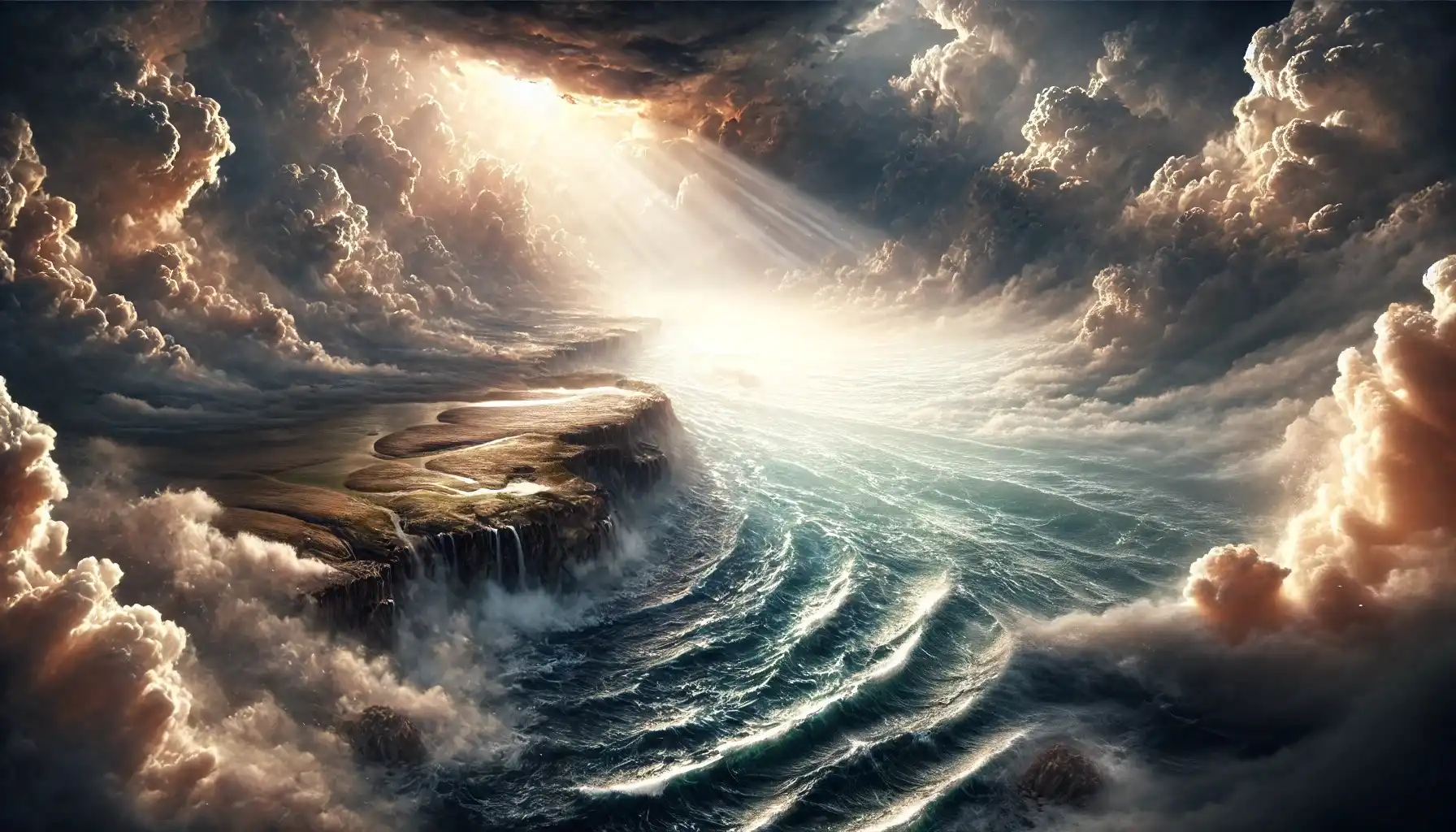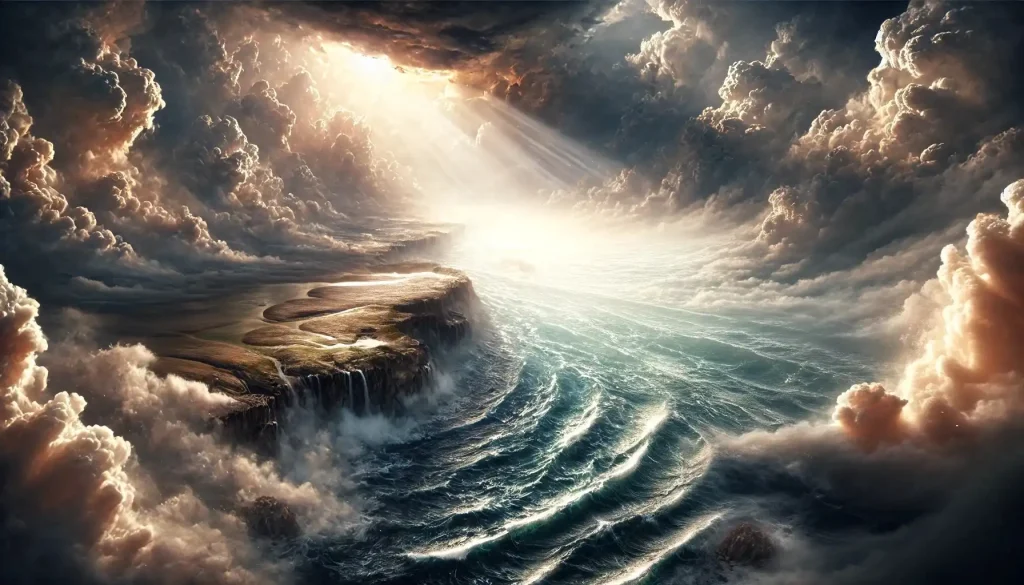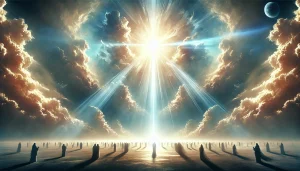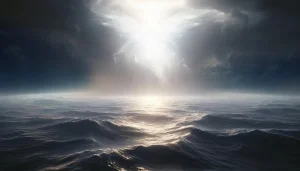
Language
וַיֹּאמֶר (and said )- Genesis 17:9, “And God said to Abraham, ‘As for you, you shall keep my covenant, you and your offspring after you throughout their generations.'”
יִקָּוּוּ (be gathered )- Jeremiah 3:17, “At that time Jerusalem shall be called the throne of the LORD, and all nations shall gather to it, to the presence of Yahweh in Jerusalem, and they shall no more stubbornly follow their own evil heart.”
הַמַּיִם (the waters )- Genesis 7:19, “And the waters prevailed so mightily on the earth that all the high mountains under the whole heaven were covered.”
מִתַּחַת הַשָּׁמָיִם (from under the heavens )- Genesis 6:17, “As for Me, behold I am bringing the flood of water upon the earth, to destroy all flesh in which is the breath of life, from under heavens; everything that is on the earth shall breathe its last.”
תֵרָאֶה (let appear, be seen )- Genesis 9:14, “When I bring clouds over the earth and the bow is seen in the clouds.”
הַיַּבָּשָׁה (the dry land )- Jonah 2:10, “And Yahweh spoke to the fish, and it vomited Jonah out upon the dry land.”
Insights
The original intended meaning of Genesis 1:9 is that is God commands the waters to gather into one place, allowing the dry land to appear, demonstrating His authority in ordering creation for the purpose of making it suitable for life.
- God’s Sovereignty
- This verse emphasizes God’s direct authority over creation. He commands, and it happens. There are no intermediaries or struggles; God’s spoken word alone brings creation into being. This underscores His sovereign power as the Creator.
- Order and Separation
- Throughout Genesis 1, God creates order by separating and gathering. In verse 9, God gathers the waters, allowing dry land to appear. This contrasts with the “deep” and “formlessness” in Genesis 1:2, showing how God overcomes chaos with His word, bringing harmony and structure to creation.
- God and Nature
- In ancient Near Eastern myths, gods often struggle with chaotic forces to create the world. In contrast, the Bible shows that God simply speaks, and nature obeys. This reflects the unique biblical theology of God’s complete mastery over nature without conflict.
- Preparation for Human Life
- The appearance of dry land sets the stage for the creation of life, particularly human life. God’s creation is orderly and purposeful, with each step building upon the previous one to prepare an environment suitable for humans. This reflects God’s care and intentionality in His creation.
John Calvin: “This also is an illustrious miracle, that the waters by their departure have given a dwelling-place to men. For even philosophers allow that the natural position of the waters was to cover the whole earth, as Moses declares they did in the beginning; first, because being an element, it must be circular, and because this element is heavier than the air, and lighter than the earth, it ought cover the latter in its whole circumference. But that the seas, being gathered together as on heaps, should give place for man, is seemingly preternatural; and therefore Scripture often extols the goodness of God in this particular.”
Matthew Henry: “The dry land emerged from the waters and was called earth, made for mankind. Previously submerged and unusable, its revelation made it functional. Likewise, God’s gifts can be wasted if buried and unused, but when revealed, they become useful. We are reminded that the land we live on belongs to God, who created it and controls it (Psalms 95:5; Jonah 1:9).”
Cross-References
- Psalm 104:6-9, “You covered it with the deep as with a garment; the waters stood above the mountains. At Your rebuke they fled… You set a boundary that they (waters) may not pass, so that they might not again cover the earth.”
- This passage echoes Genesis 1:9, where God commands the waters to be gathered together, establishing the boundaries of the seas and dry land.
- Job 38:8-11, “Who shut in the sea with doors when it burst out from the womb… and prescribed limits for it, and set bars and doors, and said, ‘Thus far shall you come, and no farther.'”
- Job 38 describes God’s sovereign control over the sea, similar to Genesis 1:9 where He gathers the waters, displaying His authority over creation.
- Jeremiah 5:22, “Do you not fear me? declares the LORD… I placed the sand as the boundary for the sea, a perpetual barrier that it cannot pass.”
- Genesis 1:9’s account of God setting boundaries for the waters is reinforced here, where God establishes the natural limits of the sea to demonstrate His power.
- 2 Peter 3:5, “For they deliberately overlook this fact, that the heavens existed long ago, and the earth was formed out of water and through water by the word of God.”
- Peter refers to the creation account, acknowledging God’s command over the waters, as seen in Genesis 1:9 when He forms the earth by separating land from the sea.
- Psalm 33:7, “He gathers the waters of the sea as a heap; He puts the deeps in storehouses.”
- This verse mirrors Genesis 1:9 by emphasizing God’s power to gather the waters and establish dry land, illustrating His creative authority.
Tri-Perspectivalism
- God’s Sovereign Command Over Creation – Genesis 1:9 demonstrates God’s absolute authority in commanding the land to appear and the waters to gather in one place. This reveals the normative principle that God’s word has supreme power to shape creation according to His will. It aligns with the biblical doctrine of creation ex nihilo, where God brings order out of chaos simply by His decree (cf. Psalm 33:9“For he spoke, and it came to be; he commanded, and it stood firm.” (Psalm 33:9)).
- The Separation and Order in Creation – The gathering of the waters and the appearance of dry land reflects God’s intentional order in creation. In the context of Genesis 1, God brings structure to the chaotic, formless world. This speaks to the situation of creation being carefully orchestrated to sustain life. For us today, it reminds us that God’s order in the world is purposeful and necessary for life to flourish (cf. Jeremiah 5:22“Should you not fear me?” declares the LORD. “Should you not tremble in my presence? I made the sand a boundary for the sea, an everlasting barrier it cannot cross.” (Jeremiah 5:22)).
- Recognizing God’s Provision and Control – On a personal level, Genesis 1:9 calls us to recognize God’s providential care over creation. As He provides dry land for humanity and creatures to dwell upon, we can trust that God orders the details of our lives as well. It invites us to rest in God’s sovereign control over both the natural world and our individual circumstances (cf. Matthew 6:26“Look at the birds of the air; they neither sow nor reap nor gather into barns, and yet your heavenly Father feeds them.” (Matthew 6:26)).
Illustrations
Applications
FAQ




